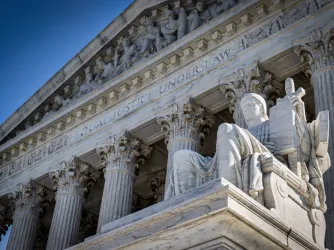Table of Contents
Harvard Law Professors Describe Creation of ‘The Sex Bureaucracy’

Last week, The Chronicle of Higher Education published an analysis by Harvard Law School professors Jacob Gersen and Jeannie Suk Gersen in which they take a comprehensive look at the creation of what they term “the sex bureaucracy,” a system in which “the feds have made colleges clumsy monitors of students’ sex lives.” The authors explore the how the federal government tried to use Title IX to fight campus sexual violence but instead wound up “enforcing a contested vision of sexual morality and disciplining those who deviate from it.”
In their piece, Gersen and Suk Gersen cover many of the issues FIRE has spoken out on, such as the twisting of Title IX through the Office for Civil Rights’ unduly broad definition of sexual harassment and the shaky legal ground of OCR’s mandate that schools use a “preponderance of the evidence” standard when adjudicating sexual misconduct cases. They explain how enforcing these provisions “created a sex bureaucracy that has in turn conscripted officials at colleges as bureaucrats of desire, responsible for defining healthy, permissible sex and disciplining deviations from those supposed norms.”
The results, which FIRE agrees are “cringeworthy but also unfair … and detrimental to the crucial fight against sexual violence,” are best exemplified by the many students suing their schools for flagrant due process violations. A common feature of these suits is the issue of colleges enforcing ambiguous definitions of consent. The authors argue that some school definitions are more aptly characterized as “how-to’s for sexual arousal, proposition, and seduction” wholly divorced from combating sexual violence. As a consequence, colleges are not only forced to invade the sphere of law enforcement by tackling criminal sexual assault, they “are now deep in the business of providing advice on sex and relationships. And they’re not good at it.”
The authors conclude with an uncomfortable question: Will the incoming administration scale back this pervasive regulation of student sexuality or use it as a tool to impose its own view of sexual morality?
Pointing to the recent trend of increasing executive power, the professors predict that “[t]he sex bureaucracy will … not only survive the change in administration, but it may flourish.”
You can read the full piece on the Chronicle’s website and a longer version in the California Law Review. FIRE, for its part, will continue to fight against threats to students’ fundamental rights from unlawful government overreach.
Recent Articles
Get the latest free speech news and analysis from FIRE.

The federal charges against Don Lemon raise serious concerns for press freedom

The American people fact-checked their government

California prohibits its teachers from talking about a student's gender identity to their parents. That raises First Amendment concerns.
